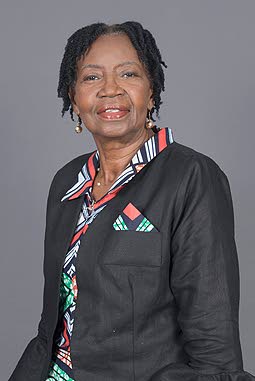On Thanksgiving Day, Donald Trump dispensed with gratitude.While most of us were trying to enjoy a holiday dinner, Trump spewed a torrent of hateful...
Vous n'êtes pas connecté
- English
- Français
- عربي
- Español
- Deutsch
- Português
- русский язык
- Català
- Italiano
- Nederlands, Vlaams
- Norsk
- فارسی
- বাংলা
- اردو
- Azərbaycan dili
- Bahasa Indonesia
- Հայերեն
- Ελληνικά
- Bosanski jezik
- українська мова
- Íslenska
- Türkmen, Түркмен
- Türkçe
- Shqip
- Eesti keel
- magyar
- Қазақ тілі
- Kalaallisut ; kalaallit oqaasii
- Lietuvių kalba
- Latviešu valoda
- македонски јазик
- Монгол
- Bahasa Melayu ; بهاس ملايو
- ဗမာစာ
- Slovenščina
- тоҷикӣ ; toğikī ; تاجیکی
- ไทย
- O'zbek ; Ўзбек ; أۇزبېك
- Tiếng Việt
- ភាសាខ្មែរ
- རྫོང་ཁ
- Soomaaliga ; af Soomaali
Headings :
 Maroc - NEWSDAY.CO.TT - A la Une - 04/07/2024 06:31
Maroc - NEWSDAY.CO.TT - A la Une - 04/07/2024 06:31
Treating mental illness in Tobago in 1856
Dr Rita Pemberton THE JOURNEY from captivity in their home communities in Africa through the various processes involved in the brutal human trade to their destinations in the Caribbean and the Americas was a trauma-filled experience. At each stage of the journey the captives were enmeshed in a psychological quagmire created by the various forms of brutality they were made to endure on land, in slave markets, in canoes on the rivers, in the forts and on the ships which carried them to their destinations in the Caribbean and the Americas. There was ample evidence of mental anguish on the part of the captive and enslaved Africans, who were described as “sullen,” “melancholy,” "dull," “lethargic,” and “suicidal” – terms which suggest they were overcome by mental afflictions, but which were viewed as deliberately cultivated bad habits. However, some of these terms were used to classify captives obtained from different parts of Africa, who were believed to be prone to such tendencies. So it became established that some communities typically produced people who displayed undesirable qualities and were troublesome. Both agents and plantation owners were advised to avoid acquiring captives from those communities. In fact, it was the practice to classify the Africans on the basis of their suitability for work on the estates, and buyers and agents demonstrated a preference for those who were young and physically strong to undertake the arduous work on plantations, and those who did not show signs of the undesirable qualities and behaviours and could be made to work. No concern was expressed about the mental state of the captives during the journey and at their location on the various plantations on which they were placed, despite the symptoms which they presented. Those symptoms were interpreted as laziness, disobedience and/or resistance to labour for which the antidote was various forms of punishment. Those who displayed signs of such afflictions were mercilessly beaten into submission, because it was assumed they did not want to work, a situation which planters refused to tolerate. Hence punishment was considered the most effective means to deal with people who exhibited symptoms which reflected some mental abnormality, and became the established practice on plantations. In an unprecedented departure from the norm, Tobago’s administration appeared to demonstrate unusual concern for the welfare of those who were of “unsound mind” who were charged and found guilty of the offences. Such people were eligible for the protection offered by the law, pending proof that the offences were committed while the accused were in an abnormal mental state. On December 10, 1856, a law entitled an Act for the Safe Custody of Insane Persons Charged with Offences and for the Better Care of Pauper Lunatics was proclaimed, after being passed in the assembly on September 19 and council on November 1, 1856. The selection of people deemed qualified for this attention is interesting. It was said that, based on the visible evidence, if it could be proven that any such person charged for an offence was insane at the time the act was committed, he or she would have the protection offered by the law. However, it was up to the justice of the peace or magistrate to determine if the person was insane at that time. Once that was established, the jury was required to acquit them and it would be agreed that since such people were dangerous, they should be appropriately housed. It then became the responsibility of the court to order that they be kept in strict custody in a place ordered and approved by the British monarch for their safekeeping. Hence the determination of mental illness was, in the first instance, a matter for justices of the peace, magistrates and the courts. This suggests that the danger that such afflicted people posed to the society was of greater importance than treating the matter as a health issue. The issues considered by the framers of the act included considering effective preventative measures for dealing with mentally ill people. It was concluded that, in order to prevent dangerous insane people from committing crimes, it was best first to discover those who were of deranged mind before they had an opportunity to be involved in criminal activity. In the interest of crime prevention, the court was empowered to commit the mentally unbalanced to detention in the jail until adequate accommodation could be provided for them. On the matter of accommodation for those who were deemed “lunatics,” consideration was given to the need to make provision for accommodation for a special group, the “pauper lunatics.” The establishment of this status was to be based on the views of two or more justices of the peace in any town or parish and on the oath of credible witnesses. They were to be certified by one or more medical practitioners who would vouch that an individual in the parish was an "idiot or lunatic or...insane” and was also destitute of any means of support. Justices of the peace were authorised to place such people under the care of someone else in each town or parish who was of good repute and was willing to undertake such responsibility. For their services, they would be paid a monthly sum considered reasonable to cover the costs of maintenance, clothing and medicine. The amount had to be approved by the governor and was to be paid for by the public treasurer out of public funds or by contributions from individuals identified by the JP. It is striking that medical opinion was not necessary to provide a diagnosis of the mental state of the Africans, and their treatment was the preserve of legal personnel and the courts. The law identified two types of the insane, the ones with criminal intent, and the destitute, both of whom needed to be housed in the interest of public safety, which was the main business of the legal arm of the administration. The responsibility of the medical officers was simply to certify what had already been established, with the support of “credible witnesses,” whose views appear to have had more weight than those of the doctors. What is also very significant is the way the different terms used to describe the mentally ill – lunatics, of unsound mind, deranged mind, idiots – led to the stereotyping of mental illness on the island into the 20th century. The post Treating mental illness in Tobago in 1856 appeared first on Trinidad and Tobago Newsday.
Articles similaires
These sick insults make Trump's illness clear
On Thanksgiving Day, Donald Trump dispensed with gratitude.While most of us were trying to enjoy a holiday dinner, Trump spewed a torrent of hateful...
‘Desperate’ South African Mercenaries Eager To Return From Russian War
Several South African men were shown milling around a parking lot wearing military uniforms bearing Russian flag badges. Behind them, a man said they...
Trump Threatens Mark Kelly For Reiterating The Military’s Obligation To The Constitution – OpEd
The Trump administration recently threatened to return retired Navy captain, former astronaut, and now Senator Mark Kelly to active duty and...
Trump Threatens Mark Kelly For Reiterating The Military’s Obligation To The Constitution – OpEd
The Trump administration recently threatened to return retired Navy captain, former astronaut, and now Senator Mark Kelly to active duty and...
The Tobago Yaws Hospital 1902-1921
The harsh working and living conditions that enslaved Africans in Tobago endured did not include access to clean water and sanitation arrangements....
Tobago planters’ problems 1805-1806
After the British regained possession of Tobago in 1793, there was a peak in the sugar industry, which enjoyed high prices, owing to the fall in...
Tobago planters’ problems 1805-1806
After the British regained possession of Tobago in 1793, there was a peak in the sugar industry, which enjoyed high prices, owing to the fall in...
A Juggernaut Of Destruction – OpEd
By George Ford Smith Nature is stingy; the things we need to sustain life above a primitive level are scarce. Fresh tomatoes, iPads, and rotator...
Trump's bizarre justification shares a grim parallel with maritime cannibalism
By Martin Danahay, Professor, English Language and Literature, Brock University The Trump administration has authorized killing people in boats on the...
Latest releases
-
Aucun élément







